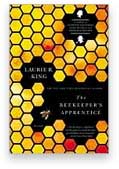It’s new to me: The Beekeeper’s Apprentice
 Without a doubt Sherlock Holmes is one of the people I greatly admire, nevermind that he’s a fictional creation, and so reading The Beekeeper’s Apprentice by Laurie R. King is a sort of wish fulfillment, where I can take some joy from someone else’s good luck at meeting the Great Detective. Because let’s face it, in his presence I would cut a pretty poor figure and so it is altogether more rewarding to read of the very bright fifteen year old Mary Russell meeting Holmes than to imagine my doing so.
Without a doubt Sherlock Holmes is one of the people I greatly admire, nevermind that he’s a fictional creation, and so reading The Beekeeper’s Apprentice by Laurie R. King is a sort of wish fulfillment, where I can take some joy from someone else’s good luck at meeting the Great Detective. Because let’s face it, in his presence I would cut a pretty poor figure and so it is altogether more rewarding to read of the very bright fifteen year old Mary Russell meeting Holmes than to imagine my doing so.
King’s creation has the wit, nerve and courage to stand beside Holmes and not be outshined. Russell is the person that we would hope a modern day young woman would want to emulate, a fact not fully apparent to me until I had finished the book and realized that it is classified as a young adult novel. Because while reading the book, I thought Russell too accomplished and too clever — perhaps not too clever for believability but for possibly for likability. You see, I am always a staunch proponent of John Watson, Holmes’ chronicler. Despite the bumbling (but endearing) portrayal of Nigel Bruce, I have always believed the good doctor to be a heroic, intelligent and worthy companion to Holmes. A sentiment that Miss Russell, at least before she meets Watson, does not share. And I frankly dislike the idea of anyone displacing the doctor as Holmes’ friend.
But let me begin at the beginning. The book begins in 1915 on the Sussex Downs, where Holmes has famously retired to keep bees, something that I have never understood. How could this man who had the pulse of the capital city of the world retire to a life of senescence in the south of England? He is admittedly beginning his sixties (King lists him as 54, obviously disagreeing with the Christopher Morley calculations) but as we know from His Last Bow he remains quite active, so the amount of cocaine required to keep him entertained must be staggering.
Sorry I digressed. Mary Russell is a tall, gangly orphaned child who only narrowly escaped while in America the car crash that killed her mother, father and brother. She now lives at her mother’s farm in Sussex under the guardianship of a hated aunt. She is a granddaughter of Israel (I may be off by a generation) and plans to study theology at Oxford. Holmes and Russell find a companionship neither had expected. Russell finds a friend and mentor and Holmes finds that his suspicions regarding the fair sex were unjust and I think it obvious he has found more than a student (especially if what I understand is true about the next book). This first book (the eleventh is due in September 2011) follows their relationship through the First World War and through Russell’s days at university. Together they solve a few crimes, large and small, but the bulk of the book concerns a nemesis from Holmes’ past who threatens all those the detective holds dear. If I say any more than this I give away the game. Only let me say that Holmes may have well met his match (were it not for the other ten books in the series).
I have a few problems with what I consider an overall very enjoyable tale. As I mentioned, Russell is so talented and her dismissal of Watson so irritating that I at first disliked her. It’s like knowing a married couple who are both amazing, talented people. Power couples are scary. But once I realized this is a young adult novel, my view changed. King has made Russell an examplar, someone worthy of admiration and that is appropriate here. And before long she is referring to Watson as Uncle John. I also am puzzled by the character of the aunt who Russell/King dismiss as not being worthy of description or speaking lines. Why then include the character? After all, she had such an effect on Russell that Holmes and Mrs. Hudson — yes, his housekeeper has followed him in retirement — observe the young woman does not get enough to eat. It would seem the aunt got lost in a book that had grown too large to include her.
These are minor quibbles and I think the first is part of my mental baggage. I would like to see myself as Watson, although I doubt I have his courage or understanding, and I jump to his defense. In reality, I found myself running late to appointments while reading the book and staying up well past my bedtime. If that is not an endorsement, I am much mistaken.
